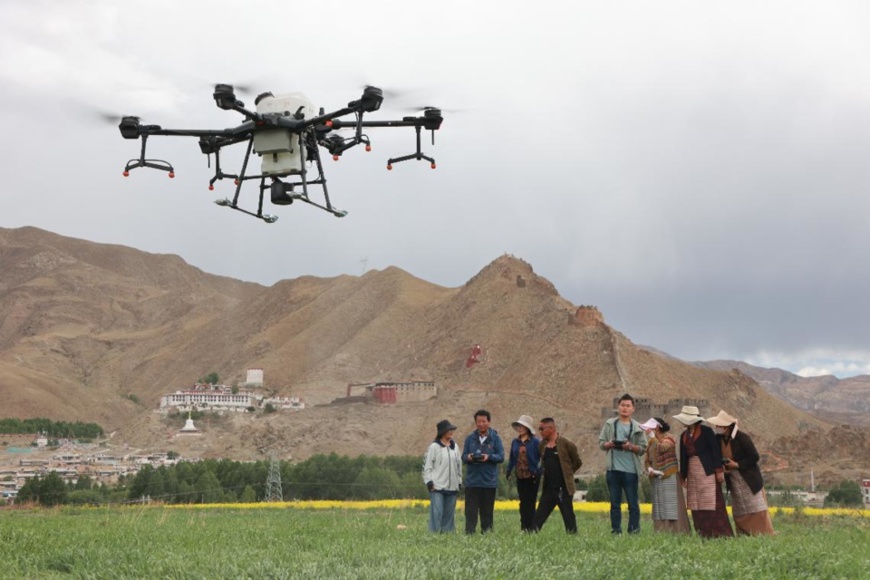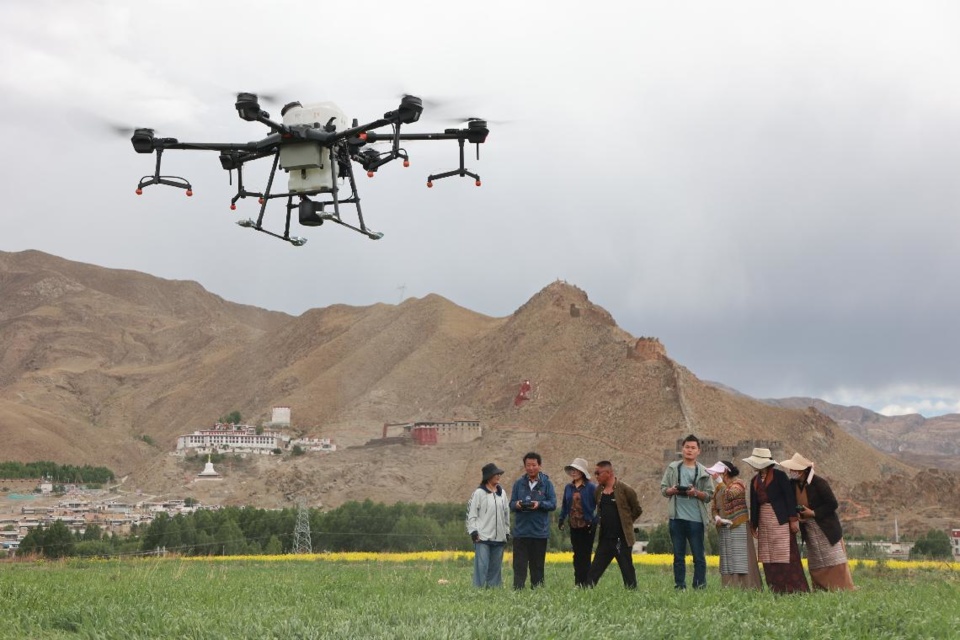By Wang Zheng, People’s Daily

A technical professional and a local skillful farmer teach villagers how to use unmanned aerial vehicles for crop protection in a village in Qonggyai county, southwest China’s Tibet autonomous region, June 17, 2021. (Photo by Wang Hu/People’s Daily Online)
As of the end of November 2021, China’s administrative villages had all been connected to broadband Internet services. At present, more than 97 percent of the counties and 40 percent of the rural townships across the country are covered by 5G network.
Rural and urban areas of the country have enjoyed equally fast Internet, with the average download rate of optical fiber network in rural areas exceeding 100Mb per second. Residents in rural areas have an increasingly strong sense of gain in sharing the fruits of Internet development.
Xingqin village in Marme township, Gerze county, Ali prefecture of southwest China’s Tibet autonomous region, is one of the 130,000 administrative villages in China that have got access to fiber-optic Internet since the implementation of the country’s compensation mechanism for telecom universal services. Today, residents in the village can watch short videos via their mobile phones while herding sheep at an altitude of about 4,600 meters.
In recent years, Gerze county has accelerated network infrastructure construction, laying about 1,000 kilometers of fiber-optic cable. With the administrative villages of the county covered by network signals and broadband Internet services, the scenario of herdspeople surfing the Internet via mobile phone while herding their flock became a reality long ago.
“I can see my cattle and sheep as well as my yard via my mobile phone and don’t have to run back and forth to check on them anymore,” said a resident in Daxiaobanzi village, Nalang township, Jone county, Gannan Tibetan autonomous prefecture, northwest China’s Gansu province.
According to the villager, since Daxiaobanzi village got access to broadband Internet services, many local residents, including himself, have used a video surveillance system launched by China Telecom, one of China’s three telecom giants, to monitor their animals and communicate with their family. The system enables migrant workers in cities far away from their homes to check on their parents and children via mobile phone.
In an effort to narrow the digital divide between rural and urban areas, China’s Ministry of Industry and Information Technology (MIIT) and Ministry of Finance have jointly formulated a compensation mechanism for telecom universal services, and facilitated the building of 60,000 4G base stations in rural areas and supported 130,000 administrative villages in the construction of fiber-optic networks through the mechanism since October 2015, eliminating the historical problem of poor communication services in rural areas.
To effectively lower the threshold for once-impoverished people to get access to and afford the Internet, China has encouraged basic telecommunication service providers to continuously offer service-price discounts of 50 percent or more to rural residents who have been lifted out of poverty, according to Xie Cun, director of the information and communication development department of the MIIT.
Targeted measures taken to cut rates for basic telecommunication services have significantly reduced the burden of broadband service charges on rural residents, helping more than 28 million rural households that were once plagued by poverty save a cumulative total of over 8.8 billion yuan ($1.38 billion), said Xie.
In the country’s vast rural areas, residents can enjoy a telecom service plan covering personal mobile phone, fixed broadband and Internet TV services for only 30 yuan to 40 yuan a month.
China Unicom, one of China’s major telecom operators, has developed a smart agriculture project that has helped 16,000 once-impoverished people in Yuexi county, Liangshan Yi autonomous prefecture in southwest China’s Sichuan province embark on a new journey toward prosperity.
Thanks to the project, which built 5G base stations and installed various devices, including cameras, in local orchards, data on environmental factors, such as light, pest, manure of fermented night-soil mixed with water, temperature, and humidity, as well as real-time monitoring images are continuously transmitted to a big data center from orchards.
The intelligent control system of the project enables farmers to operate agricultural equipment such as equipment for drip irrigation remotely.
The key to expanding the usage of Internet services in rural areas is to integrate relevant services into agricultural production and bring into play the role of the Internet in facilitating poverty alleviation and rural vitalization, empowering the production and life of people in rural areas, and improving public services, said Tian Yulong, chief engineer at the MIIT.
Continuous improvement in Internet services has underpinned the development of e-commerce, tourism, and smart agriculture in rural areas of China, which have become important sources of income for farmers.
During the first three quarters of 2021, rural online retail sales in China reached 1,429.31 billion yuan, up 16.3 percent year on year, while the online retail sales of agricultural products climbed 1.5 percent from the same period of 2020 to 304.39 billion yuan, according to latest data.
So far, all elementary schools and middle schools in rural areas have basically been connected to Internet services, Tian said, adding that in particular, since the outbreak of the COVID-19 pandemic, China has witnessed notable results in the development of online education.
The country will continue boosting the integration of the Internet into the health and education sectors and encourage various cities to promote the in-depth integration of network technology into e-commerce, rural tourism and farming, so as to unleash the dividends of digital technologies and advance the modernization of agriculture, according to Tian.
Rural and urban areas of the country have enjoyed equally fast Internet, with the average download rate of optical fiber network in rural areas exceeding 100Mb per second. Residents in rural areas have an increasingly strong sense of gain in sharing the fruits of Internet development.
Xingqin village in Marme township, Gerze county, Ali prefecture of southwest China’s Tibet autonomous region, is one of the 130,000 administrative villages in China that have got access to fiber-optic Internet since the implementation of the country’s compensation mechanism for telecom universal services. Today, residents in the village can watch short videos via their mobile phones while herding sheep at an altitude of about 4,600 meters.
In recent years, Gerze county has accelerated network infrastructure construction, laying about 1,000 kilometers of fiber-optic cable. With the administrative villages of the county covered by network signals and broadband Internet services, the scenario of herdspeople surfing the Internet via mobile phone while herding their flock became a reality long ago.
“I can see my cattle and sheep as well as my yard via my mobile phone and don’t have to run back and forth to check on them anymore,” said a resident in Daxiaobanzi village, Nalang township, Jone county, Gannan Tibetan autonomous prefecture, northwest China’s Gansu province.
According to the villager, since Daxiaobanzi village got access to broadband Internet services, many local residents, including himself, have used a video surveillance system launched by China Telecom, one of China’s three telecom giants, to monitor their animals and communicate with their family. The system enables migrant workers in cities far away from their homes to check on their parents and children via mobile phone.
In an effort to narrow the digital divide between rural and urban areas, China’s Ministry of Industry and Information Technology (MIIT) and Ministry of Finance have jointly formulated a compensation mechanism for telecom universal services, and facilitated the building of 60,000 4G base stations in rural areas and supported 130,000 administrative villages in the construction of fiber-optic networks through the mechanism since October 2015, eliminating the historical problem of poor communication services in rural areas.
To effectively lower the threshold for once-impoverished people to get access to and afford the Internet, China has encouraged basic telecommunication service providers to continuously offer service-price discounts of 50 percent or more to rural residents who have been lifted out of poverty, according to Xie Cun, director of the information and communication development department of the MIIT.
Targeted measures taken to cut rates for basic telecommunication services have significantly reduced the burden of broadband service charges on rural residents, helping more than 28 million rural households that were once plagued by poverty save a cumulative total of over 8.8 billion yuan ($1.38 billion), said Xie.
In the country’s vast rural areas, residents can enjoy a telecom service plan covering personal mobile phone, fixed broadband and Internet TV services for only 30 yuan to 40 yuan a month.
China Unicom, one of China’s major telecom operators, has developed a smart agriculture project that has helped 16,000 once-impoverished people in Yuexi county, Liangshan Yi autonomous prefecture in southwest China’s Sichuan province embark on a new journey toward prosperity.
Thanks to the project, which built 5G base stations and installed various devices, including cameras, in local orchards, data on environmental factors, such as light, pest, manure of fermented night-soil mixed with water, temperature, and humidity, as well as real-time monitoring images are continuously transmitted to a big data center from orchards.
The intelligent control system of the project enables farmers to operate agricultural equipment such as equipment for drip irrigation remotely.
The key to expanding the usage of Internet services in rural areas is to integrate relevant services into agricultural production and bring into play the role of the Internet in facilitating poverty alleviation and rural vitalization, empowering the production and life of people in rural areas, and improving public services, said Tian Yulong, chief engineer at the MIIT.
Continuous improvement in Internet services has underpinned the development of e-commerce, tourism, and smart agriculture in rural areas of China, which have become important sources of income for farmers.
During the first three quarters of 2021, rural online retail sales in China reached 1,429.31 billion yuan, up 16.3 percent year on year, while the online retail sales of agricultural products climbed 1.5 percent from the same period of 2020 to 304.39 billion yuan, according to latest data.
So far, all elementary schools and middle schools in rural areas have basically been connected to Internet services, Tian said, adding that in particular, since the outbreak of the COVID-19 pandemic, China has witnessed notable results in the development of online education.
The country will continue boosting the integration of the Internet into the health and education sectors and encourage various cities to promote the in-depth integration of network technology into e-commerce, rural tourism and farming, so as to unleash the dividends of digital technologies and advance the modernization of agriculture, according to Tian.
 Menu
Menu
 All administrative villages in China covered by broadband Internet services
All administrative villages in China covered by broadband Internet services
















